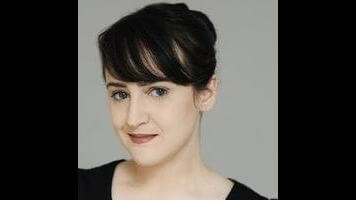Mara Wilson shines like a beacon in the witty and touching Where Am I Now?

One of the many rites of passage for former child stars is releasing a tell-all book detailing their rapid ascension that’s often all-too-quickly replaced with rejection or humiliation. That isn’t always the case, of course, but it’s a such a common occurrence that it can be a relief to read one that’s candid but not constantly cringe inducing. Mara Wilson, of Mrs. Doubtfire and Matilda fame, has released a collection of essays that falls into the latter category, while still featuring plenty of devastating revelations.
About halfway into her memoir, Where Am I Now?: True Stories Of Girlhood And Accidental Fame, Wilson addresses a letter to Matilda, the character she played in Danny DeVito’s adaptation of the Roald Dahl book. In it, Wilson describes her joy in playing the role, while also expounding on her connection to the source material. Matilda may have been among her brothers’ favorite books, but Dahl’s pint-sized creation became a part of Wilson before she’d even read the script.
There might have been a moment when I thought that you, as a character, were mine. That I got to be you, the way I wanted when I first heard of you.
DeVito and Rhea Perlman, who played her parents in the film, turned the set of Matilda into a second home for Wilson in 1995, whose mother died from cancer that same year. The bond between actress and role would be tested in the years to come, as Wilson tried to distance or otherwise distinguish herself from the character. But that brilliant little girl represented the kind of “badass” she always wanted to be, and knew she could be. Wilson ends the letter by thanking Matilda for giving her and so many other children hope, while lighting a beacon for the brainy and anxious with her own published work.
The fact that Wilson made it through childhood stardom mostly intact would be inspirational enough on its own, but she’s found a second career since “outgrowing her cuteness.” She’s now a playwright and the host of her own storytelling series, with a sharp wit that she doles out on her must-read Twitter account. But that’s hardly a surprising outcome because, as Wilson reveals early on, she’s always been a storyteller. Long before she portrayed one of literature’s most beloved characters, Wilson was spinning yarns for her family and friends, though she admits she could have used an editor.
The adult Wilson has a similarly expansive approach to storytelling, moving in and out of anecdotes as if she were playing a game of word association with herself. A story that begins with a 5-year-old Wilson can wander into a scene from her teen years, then snap back in time at the remembrance of something else from her past. But in each reverie, she establishes a strong sense of time and place with savvy pop-culture references and their real-life inspirations (the John Burroughs High School serves as the setting for Wilson’s own precursor to Glee). The author also has a firm grasp of her themes, so these tangents serve as flourishes rather than distractions.
My sister and I have the same roundabout, digressive, all over the place way of talking, jumping from A to B to Z and then back to C and D. Sometimes my friends get confused, but Anna always gets it, and I always get her.
Where Am I Now? wouldn’t be much of a memoir without some insider info, but Wilson’s not interested in recounting salacious stories from the set. It’s not likely that she has any, since she stopped acting in her teens. She also reveals she once appointed herself a one-child “anti-sex league” after learning about sex and the casual attitude toward it held by the fictional inhabitants of Fox’s Melrose Place, on which she had a recurring role. What Wilson does divulge is how long she struggled with the “Matilda-whore complex,” and the proprietary way that fans of the Matilda film and book still feel about the character.
No one, Wilson tells us, wants to think of Matilda—or the actress who played her—and sex. But while the character may be ageless, Wilson’s now a 29-year-old woman, who’s been through puberty and college. And the industry’s (as well as fans’) desire to preserve the precocious little girl she once played did real, though not irreversible, damage to the young girl she once was. When those efforts failed and casting agents didn’t know what to make of the self-described angsty teen, Wilson was left to reinvent herself.
That turned out to be a more difficult undertaking than she could have anticipated, made all the more difficult by losing her mother at a young age. But she muddled through, even though her depression and obsessive-compulsive disorder manifested before she hit puberty. Wilson has been forthcoming about the mental health issues she details in her memoir, and has even partnered with Project UROK for a video about living with—and getting help for—anxiety. Just as Wilson once identified with Dahl’s adorable little bookworm, so too will readers of her memoir, who may be dealing with mental health issues of their own, find hope in her revelations.
Purchasing via Amazon helps support The A.V. Club.